A New Jersey court has admitted evidence into a criminal matter based on the “fresh complaint” exception to hearsay.
A Superior Court recently ruled that the prosecution can use testimony from two witnesses in a sexual assault case. According to sources, the witnesses assert that a 16-year-old student at a Paterson, New Jersey, school told them she had intimate relations with a local teacher from Parsippany.
One witness is a close female friend of the alleged victim, and the other is the former boyfriend of the 16-year old. Because of the recent ruling, both witnesses may testify in the trial of defendant, who is a former music teacher at a local Paterson school. The suspect was 44 when the alleged incidents transpired in his home and school office in May 2010. With the pending allegations, the man faces serious charges, including official misconduct andsexual assault.
Hearsay and the “fresh complaint” exception
In the ruling, Judge Robert Gilson in Morristown has admitted the vocal evidence under what is known as the “fresh complaint” hearsay exception. In general, “hearsay” is not admissible in a criminal proceeding. Hearsay is a “statement made out of court that is offered as evidence to prove the truth of the matter asserted.” In this case, the hearsay evidence is the purported statements made by the victim to the witnesses.
Despite the general inadmissibility of hearsay statements, the fresh complaint exception permits such evidence for criminal sexual offenses. The policy is that victims of sexual crimes frequently remain silent about attacks. In many cases, the fresh complaint exception may be permitted in a court of law if the victim’s statements were voluntarily directed to someone he or she would “ordinarily turn to for support.” In this case, the alleged victim relayed the information to her boyfriend at the time and close friend.
According to the ex-boyfriend, the alleged victim initially told him that the defendant had touched her sexually. However, later, the young woman later acknowledged that she had sexual intercourse with the suspect. The female friend, on the other hand, testified that around May 2010, the alleged victim indicated that she had “a crush” on the teacher. Later, the young woman allegedly told her friend that she engaged in a sexual relationship with the defendant.
The need for a criminal defense attorney
Hearsay evidence is often inadmissible in criminal proceedings, as the information can be very unreliable. This is especially true when the hearsay evidence suggests changes or inconsistencies in an overall story. Nevertheless, the law protects victims of sexual assault, and this makes the evidence permitted – no matter how unreliable the statements may be.
If you have been charged with a crime, it is imperative to seek assistance from an experienced local attorney. Many cases can be based on “he said, she said” evidence, and a seasoned criminal attorney can help challenge any erroneous admissions.
Keywords: Hearsay, evidence, testimony, exceptions
